Are you a Quiet Speculation member?
If not, now is a perfect time to join up! Our powerful tools, breaking-news analysis, and exclusive Discord channel will make sure you stay up to date and ahead of the curve.
A new set is on the horizon, so it's spoiler time again! War of the Spark is the first set designed as a planeswalker set, which means there are an unprecedented number about to drop. More interestingly, most of them have static abilities rather than the traditional plus, minus, and ultimate combo we've become accustomed to. A number of them look to be curious and impactful, but they have a problem that may be disqualifying. Today I'll be examining a promising example in Teferi, Time Raveler, using him to demonstrate the issue with these static walkers.
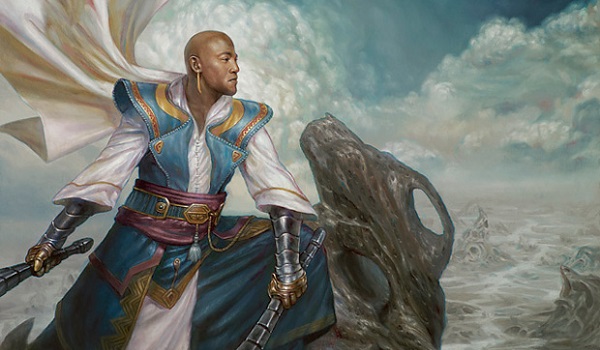
Cleveland Phoenix Check-In
Before moving on, there was another major Modern event last weekend, this time the Cleveland SCG Open. I have been hopeful that the apparent warp in the metagame caused by Izzet Phoenix would diminsh. The data from Cleveland indicates this is not the case. The Day 2 metagame is what we've come to expect: Phoenix is the most popular deck by far, though underneath those numbers the metagame looks diverse and healthy.
The Top 8 is more interesting because Phoenix and Amulet Titan are tied for most copies. Of note, the winning list readopted the Hive Mind combo kill. Said combo had disappeared after Summer Bloom's banning, and I'm curious whether this was inertia on Sam Lawrence's part or a deliberate metagame choice. In any case, it appears that the format continues to struggle to control the firebird.
New Time Pressure
Jordan covered Karn, the Great Creator last week, smelling real potential. The other discussion-worthy new planeswalker is Teferi, Time Raveler. A three-mana walker with 4 loyalty is already worth looking into, but Teferi has an ace up his considerable sleeves: he shuts out opposing instants, boasting huge implications for control mirrors.
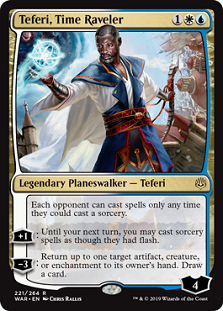 Based on past experience, it seems like new Teferi should be very good, because the last card with that static ability was very good. Teferi, Mage of Zhalfir proved a critical card for Time Spiral-era Mythical Teachings control, and in the mirror, whoever untapped with him typically won. Teachings decks played almost entirely at instant speed, and the mirror was dictated by correct sequencing and card advantage. Teferi allowed his controller to dictate the pace of the game and invalidate any counterspells or other protection while establishing a clock.
Based on past experience, it seems like new Teferi should be very good, because the last card with that static ability was very good. Teferi, Mage of Zhalfir proved a critical card for Time Spiral-era Mythical Teachings control, and in the mirror, whoever untapped with him typically won. Teachings decks played almost entirely at instant speed, and the mirror was dictated by correct sequencing and card advantage. Teferi allowed his controller to dictate the pace of the game and invalidate any counterspells or other protection while establishing a clock.
Time Raveler costs just half what Mage does, which is everything in Modern. It also allows for greater flexibility with a player's own sorceries. This appears to be a very potent combination.
Obvious Home
Naturally, it makes sense to try Raveler in a control shell. As of when I did my testing, the most recent good finish came from GP Calgary in the form of UW Control. The Esper list from Cleveland is very interesting, but given how testing played out, I doubt I would have come to a different conclusion.
UW Control, Austin Anderson (7th Place, GP Calgary)
I've previously noted that this deck is well-positioned against Izzet Phoenix, though it's a little light in the sideboard against other control decks. Still, with eleven counterspells and plenty of card advantage, it had everything necessary as a test vehicle.
Actual Utility
I only tested Raveler in the control mirror, because that's where I deemed him most likely to be relevant. Limiting opponents to sorcery speed is a fine ability, but that's usually all non-combo decks do anyway. Aggro may play a few instants, almost always creature removal; outside of Spirits, though, the creatures don't have flash. Lots of decks have Lightning Bolt, but that's not important against control. A typical Tron deck has no instants, so Raveler's static ability isn't relevant there, either. My example deck only has six sorceries, so it would be most impacted by Teferi.
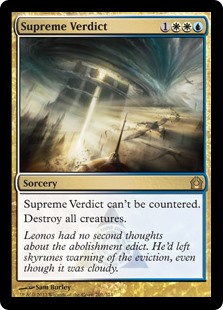 His other abilities are also pretty mediocre. The main reason to play sorceries at instant speed against not-control is to Supreme Verdict during combat or end of turn, and when Terminus can already be miracled as an instant, it's not a very useful upgrade. There is something to be said for playing Serum Visions and sorcery speed card advantage as instants for the mana advantage and flexibility, but since they don't see much play in the first place I think it's marginal at best.
His other abilities are also pretty mediocre. The main reason to play sorceries at instant speed against not-control is to Supreme Verdict during combat or end of turn, and when Terminus can already be miracled as an instant, it's not a very useful upgrade. There is something to be said for playing Serum Visions and sorcery speed card advantage as instants for the mana advantage and flexibility, but since they don't see much play in the first place I think it's marginal at best.
The downtick isn't bad, as bouncing a creature and drawing a card is a decent tempo play. It may be actively good if the creature is Gurmag Angler or you have your own threats out. However, most creature decks are either going too wide or gain intrinsic value from being played these days, so Repulse isn't a very good ability. That Raveler is great in control mirrors is the impression most players have when they see him, and all things considered it makes the most sense to test him in that capacity.
The Catch
The question lingers of just how valuable Raveler actually is. Again, the original Teferi was often crippling in the control mirror, and given that my example deck runs 11 total counterspells, it seems like Raveler should be great. However, I was skeptical. Yes, he shuts off opposing counterspells and locks opponents off your turn, but Teferi cannot win the game alone. None of his abilities actually kill the opponent, so they can just ignore him entirely if they wish. At least Teferi, Hero of Dominaria demands an answer, because he can tuck himself into the library and opponents will eventually deck themselves.
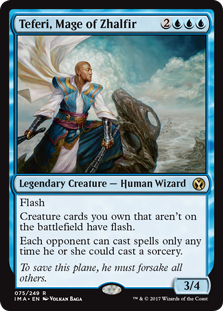 There's also the question of relevance. It makes sense that countering critical spells is good for control, but I'm not certain that it actually translates into wins. Modern UW Control wins mostly by forcing a concession once it has cleared the board and has overwhelming card advantage. What may be the Ur-example of a control mirror came from Time Spiral block and wasn't decided by counterspells, but through exceptional resource management: for the most part, both players were resolving their important spells at sorcery speed. This wasn't because of Teferi but because each deck had exactly 4 Cancel and 2 Draining Whelk so there was limited need to play around counters. Their spells were better as sorceries anyway and since the match was about maximizing card impact, Teferi's disruption wasn't very relevant.
There's also the question of relevance. It makes sense that countering critical spells is good for control, but I'm not certain that it actually translates into wins. Modern UW Control wins mostly by forcing a concession once it has cleared the board and has overwhelming card advantage. What may be the Ur-example of a control mirror came from Time Spiral block and wasn't decided by counterspells, but through exceptional resource management: for the most part, both players were resolving their important spells at sorcery speed. This wasn't because of Teferi but because each deck had exactly 4 Cancel and 2 Draining Whelk so there was limited need to play around counters. Their spells were better as sorceries anyway and since the match was about maximizing card impact, Teferi's disruption wasn't very relevant.
It's been a while since I sleeved up a control deck. I remember counters were very relevant in the mirror back then, but Modern is a very different format now. Before I tested Raveler personally, I asked some dedicated local control players what they thought. Every one's knee-jerk reaction was that it was a house and would be a great sideboard card. However, as they started to explain why, they all walked their opinion back. The consensus answer ended up being, tautologically, that counterspells only matter when they matter because what's important is sticking some form of persistent card advantage and riding it to victory. Teferi ensures that you will resolve your own subsequent walkers, but it may or may not impact the opponent's ability to do so first. Thus, they weren't sure how good Teferi would actually be in practice.
An Overall Problem
To test Teferi, I took the example list and proxied two decks. One was the list in it's control mirror configuration (sweepers out, angels and counters in) and the other played Time Raveler instead of the extra Negate and a Dispel. The default won 8 of 13 games. In fairness to Teferi, I was testing against a more experienced control player. However, if the roles were reversed I don't think it would suddenly have made Teferi a game changer.
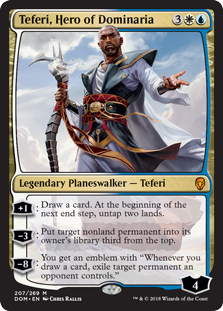 The problem was that Teferi didn't do anything. He's like Null Rod's flavor text but worse. Teferi came down and shut off opposing counters. And then I could downtick him to bounce Search for Azcanta // Azcanta, the Sunken Ruin and draw a card at best, but typically I could only tick him up. And I could tick Teferi up indefinitely at no penalty to my opponent or meaning for me because I only had 2 Serum Visions and Time Raveler has no ultimate. Meanwhile, my opponent could simply ignore Teferi and start slamming threats until I cracked. And despite having counters I often did crack because I'd spent a card on Teferi. He also frequently made me spin my wheels with Cryptic Command, which unlike the other counters still had text. The nail in the coffin was that Time Raveler doesn't interact with planeswalkers nor can he keep up with their card advantage. He was simply outclassed.
The problem was that Teferi didn't do anything. He's like Null Rod's flavor text but worse. Teferi came down and shut off opposing counters. And then I could downtick him to bounce Search for Azcanta // Azcanta, the Sunken Ruin and draw a card at best, but typically I could only tick him up. And I could tick Teferi up indefinitely at no penalty to my opponent or meaning for me because I only had 2 Serum Visions and Time Raveler has no ultimate. Meanwhile, my opponent could simply ignore Teferi and start slamming threats until I cracked. And despite having counters I often did crack because I'd spent a card on Teferi. He also frequently made me spin my wheels with Cryptic Command, which unlike the other counters still had text. The nail in the coffin was that Time Raveler doesn't interact with planeswalkers nor can he keep up with their card advantage. He was simply outclassed.
Teferi's static ability and cost make him seem like a very potent card. However, the reality is that he only really impacts counterspells and which are of such variable importance that I'm not sure it's worthwhile. Combine that with really mediocre abilities and I don't think Teferi justifies sideboard space in control decks. I didn't test him as combo protection, but I'm skeptical that he'd ever beat Boseiju, Who Shelters All as counterspell killer.
A Designed Flaw
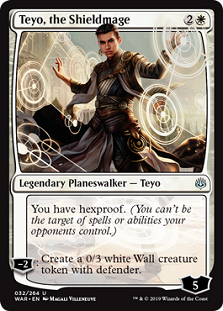 Ultimately, this is the problem with all the new static planeswalkers. The static abilities are very relevant, but if the rest of the planeswalker isn't, what's left is a worse enchantment. Consider Teyo, the Shieldmage. At three mana, he provides the same effect as Leyline of Sanctity. Teyo always costs three mana, while Leyline is zero or four dependent on having it in your opening hand. The advantage there is unclear, but being an enchantment is a big advantage for Leyline, because it can only be removed with Assassin's Trophy or actual enchantment removal. Teyo can be Bolted or attacked. For that reason, Leyline is often game over against Burn, while I would guess that Teyo is mildly annoying at best.
Ultimately, this is the problem with all the new static planeswalkers. The static abilities are very relevant, but if the rest of the planeswalker isn't, what's left is a worse enchantment. Consider Teyo, the Shieldmage. At three mana, he provides the same effect as Leyline of Sanctity. Teyo always costs three mana, while Leyline is zero or four dependent on having it in your opening hand. The advantage there is unclear, but being an enchantment is a big advantage for Leyline, because it can only be removed with Assassin's Trophy or actual enchantment removal. Teyo can be Bolted or attacked. For that reason, Leyline is often game over against Burn, while I would guess that Teyo is mildly annoying at best.
The only other thing Teyo can do is downtick to make 0/3 walls. That is potentially relevant against Burn since it blocks Goblin Guide, but that's all Teyo can do. There's no way to add loyalty because he has no uptick ability at all. This is partially a balance consideration and mostly to make proliferate relevant.
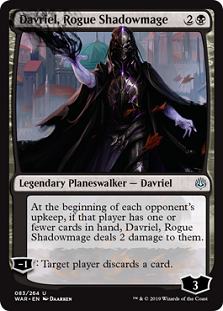 As another example, consider Davriel, Rogue Shadowmage. He's been speculated on since he makes 8-Rack into 12-Rack and adds to the hand pressure without hitting you, unlike Liliana of the Veil. However, he can only be used twice before going away, unlike the infinitely-usable Liliana.
As another example, consider Davriel, Rogue Shadowmage. He's been speculated on since he makes 8-Rack into 12-Rack and adds to the hand pressure without hitting you, unlike Liliana of the Veil. However, he can only be used twice before going away, unlike the infinitely-usable Liliana.
He's also worse than The Rack or Shrieking Affliction. He's not only more vulnerable as previously discussed, but he also does less damage which translates into more time for opponents to find a way out and/or race 8-Rack. Davriel is a fine card, but not an exceptional one and that's really the story of the War 'Walkers. They're fine cards in context, but not exceptional.
Limited Utility
This is no accident. Wizards was worried that too many normal planeswalkers would destabilize Standard, and they had to heavily moderate them. The static walkers were designed to have potent effects, but be fragile. There's very little utility to these cards unless the static effect is relevant, and even if it is, they're all very fragile.
This means, for the most part, the new planeswalkers are more fragile and swingy than any previous iterations. On the one hand, they have potentially game-swinging static abilities. On the other, if that isn't the case, they're irrelevant to the point of unplayability. To make matters worse, they're far easier to remove than equivalent enchantments or artifacts.
War is Changing
There are still plenty of walkers to be revealed, which could change my mind. However, they'll need to be powerhouses to overcome the inherent vulnerability of being attackable enchantments. Only time will tell whether that is the case.




Teferi is actually more suitable in a deck like UW Midrange that can struggle vs Control mirrors, namely Miracles, and some Combo decks. You can leverage its abilities to cast threats like Resto uncontested and protected in combat. The deck also already naturally plays Serum Visions and Supreme Verdict. Lastly, you can utilize its -3 ability to reuse cards like Omens, Snap, Finks, Clique, Halo, and Sphere.
True, the static ability is very relevant. However, I question the actual utility of the other modes. How often will you need/want to cast sorceries on the opponent’s turn? Also UW has Resto and frequently Flickerwisp to reuse everything as is, do you want to jump through the extra hoop of recasting it?
Additionally experience with UW Midrange, and this was years ago, is that the three drop spot is packed. It seems like Teferi will be at least decent if you’re ahead on board, but if not then it doesn’t do enough on his own to catch you up.
I know my question isnt exactly about teferi, but if death and taxes were to run blue, would the new dovin and this teferi be pretty perfect for their decks 3 drop? Between thalia and Dovin or this teferi, it seems death and taxes got a big boost. Besides they received two new hate bears in the last set, though the newest one really is best in the legacy version.
That is certainly possible. The disruption isn’t exactly universal but could be potent in the right place and they could be sideboard material in the right matchup.
The problem is that DnT’s three drop slot is incredibly crowded. Between Flickerwisp, Blade Splicer, Thalia, Heretic Cathar, etc, its already very easy for hands to get clogged and the deck to clunk out. It’s worth some investigation, but I’m skeptical.
Talking about Teferi without mentioning the very nice interaction he’s got with Spell Queller? 😉
I was just looking at UW Control.